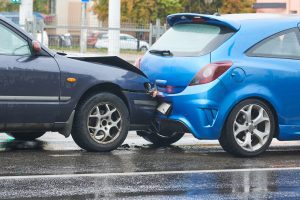Nerve damage can have a serious impact on your everyday life. It may leave you in chronic pain, reduce your quality of life, impact your well-being and leave you unable to participate in everyday activities. If you experienced nerve damage after a car accident which was not your fault, you may be owed compensation.
In our guide, we begin by setting out the eligibility criteria your claim will need to meet. Next, you can find information on the factors affecting how compensation may be calculated in road traffic accident claims.
Additionally, we cover the types of evidence which could help your case, how long you have to start a claim and how one of our solicitors could help you.
Whether you have any questions about nerve damage claims or are ready to start yours, please contact an advisor.
Jump To A Section
- Can I Make A Car Accident Nerve Damage Claim?
- What Compensation For Nerve Damage After A Car Accident Could I Get?
- The Common Signs Of Nerve Damage After A Car Accident
- What Evidence Will I Need To Support A Nerve Damage Claim?
- Is There A Time Limit To Claiming After A Car Accident?
- Get Help From Accident Claims
- FAQs
- More Information
Can I Make A Car Accident Nerve Damage Claim?
To make a car accident nerve damage claim, you must meet specific eligibility criteria. These are:
- Another road user had a duty of care towards you.
- They breached this duty, such as through careless or reckless driving.
- The breach caused an accident in which you suffered nerve damage.
All road users in the UK, such as motorists, motorcyclists, cyclists and even pedestrians, have a duty of care to use the roads in a safe manner to avoid causing harm. They should comply with the Highway Code and the Road Traffic Act 1988 as part of their duty of care.
Can I Claim If I Wasn’t Wearing A Seatbelt?
You could still claim if you suffered a nerve damage injury in a car accident whilst not wearing a seatbelt, if another party caused the accident in which you were injured.
However, if you were not wearing a seatbelt at the time of the accident, you may be said to have contributed towards your injuries. Under contributory negligence, your compensation may be reduced by a percentage based on the degree to which your failure to wear a seatbelt worsened your injury.
What If I Was A Passenger Of The Liable Party?
Your ability to claim for nerve damage after a car accident remains the same whether you were a passenger of the liable party, another vehicle or even a pedestrian. Passengers are not responsible for road accidents. Your claim would be made against the driver’s insurance, in the same way any other party would do so.
Can I Claim On Behalf Of A Loved One?
You could make a nerve injury compensation claim on behalf of a loved one in certain circumstances. These are in cases where the injured person cannot make their own claim such as:
- Minors
- Those lacking the mental capacity
In these instances, you could act as their litigation friend. This involves filing the claim on their behalf, making decisions about the claim in their best interests and working with a solicitor. You can apply for this role or be appointed by the courts as one.
Our solicitors are experts in helping people make personal injury claims. A solicitor could assess your case and help to determine whether you are eligible to make a claim for nerve damage after a car accident.
What Compensation For Nerve Damage After A Car Accident Could I Get?
Compensation for nerve damage after a car accident may include two heads of loss. These are, general damages for pain, suffering and loss of amenity (e.g. not being able to participate in your hobbies), and special damages for financial losses.
Your general damages may be valued with help from the Judicial College Guidelines (JCG). The JCG is a document outlining compensation guidelines for various types of injuries.
In the table below, we have used some of the JCG’s figures.
Please note that the first entry and the final two entries have not been taken from the JCG.
| Injury | Severity | Notes | Compensation |
|---|---|---|---|
| Multiple injuries which are severe. Special damages are also included. | Most severe injuries. | Compensation for the multiple severe injuries you have suffered as well as any financial losses such as lost earnings. | Up to £1,000,000+ |
| Paralysis. | Tetraplegia | Factors such as whether physical pain is present and if the senses have been significantly impacted will effect the amount awarded | £396,140 to £493,000. |
| Paraplegia | Factors such as the extent and degree of pain, and life expectancy will impact compensation. | £267,340 to £346,890. | |
| Back injury. | Severe - (i) | Severe nerve toot damage and spinal cord damage | £111,150 to £196,450. |
| Severe - (ii) | Damage to the nerve roots causing loss of sensation. | £90,510 to £107,910. | |
| Moderate - (i) | Reduced mobility due to nerve root irritation with damage to the intervertebral disc. | £33,880 to £47,320 | |
| Leg injury | Less serious (i) | Soft tissue injuries leading to some nerve damage in the lower limbs and a significant cosmetic deficit. | £21,920 to £33,880 |
| Hand injury. | Serious injury to the thumb | Such as nerve damage or the tip of the thumb being amputated. | £15,370 to £20,460. |
| Moderate injury to the thumb | Causing nerve or tendon damage and leading to a loss of sensation. | £11,800 to £15,370. | |
| Whiplash | Whiplash with psychological injuries | Lasting between 18 to 24 months | £4,345 |
| Whiplash injuries | Lasting between 18 to 24 months | £4,215 |
What Would Affect My Final Settlement?
Your final settlement may be affected by your eligibility to claim for financial losses associated with your injury under special damages. Nerve damage sustained in a car crash could impact and affect different areas of your life.
Depending on the impact your car accident has had on you, you may be able to claim for financial losses such as:
- Loss of income. You may be compensated for lost wages, reduced earning capacity, and further impacts such as career progression or contributions towards pensions, etc. You may be asked to provide payslips or statements from your employer in support of such claims.
- Medical expenses. You could claim for the cost of private physical therapy, surgery or other treatment and medication necessary to treat your nerve injury. You can keep invoices to demonstrate such expenses.
- Mobility aids. Permanent damage to your nerves may mean you need to use mobility aids to assist you in carrying out everyday tasks. Invoices and receipts may be used to help prove these losses.
- Travel costs. Expenses related to travelling to appointments, such as for physiotherapy. Keep travel tickets and invoices to help you prove such costs.
- Care costs. This may include the cost of professional care or assistance for your family during your recovery period and beyond if necessary. You can submit invoices for such care as part of your claim.
An advisor could help guide you through what you may be eligible to claim following a car accident.
The Whiplash Injury Regulations 2021
Certain road traffic accident claims in Wales and England may be affected by the Whiplash Reform Programme. These claims will need to be made via a different avenue if they meet the following criteria:
- The injured party was the driver or passenger of a vehicle
- They were 18+ years old
- The injuries sustained were valued at £5,000 or less. This could include whiplash, minor sprains and soft tissue injuries.
These injuries will be valued using the fixed tariff within the Whiplash Injury Regulations 2021. We have featured two of these figures in the table above.
It is also important to note the following:
- Additional injuries suffered that are not covered by this whiplash tariff will be valued traditionally
- Any further injuries suffered that bring the overall value of this claim above £5,000 will mean the claim needs to be made the traditional way, but the whiplash tariff will still apply for the relevant injuries.
Contact our advisors today to learn more about claiming compensation for nerve damage after a car accident.
The Common Signs Of Nerve Damage After A Car Accident
Neuropathy, or nerve damage, may be caused by physical trauma from a car crash or other road traffic accident. It may occur where part of the nervous system is damaged, disrupting signals between the brain and spinal cord and the rest of the body.
Below, we look at some of the common symptoms of nerve damage after a car accident.
Numbness And Tingling
Numbness and tingling (also called paresthesia) are common following nerve damage. Damage to the sensory nerves can disrupt nerve pathways, causing symptoms such as tingling and loss of sensation in the feet or hands. This could cause problems gripping objects or maintaining balance.
These symptoms could indicate that you suffered a pinched nerve. This may be caused by a seatbelt tightening across the body or by impact with a part of the car.
Muscle Weakness
Muscle weakness may present as reduced strength in your arms, legs or other body parts, limiting your mobility or ability to carry out everyday tasks.
These symptoms may indicate motor nerve damage caused by blunt force trauma, whiplash or a herniated disc.
Shooting Pains
Shooting pains may also indicate nerve damage. Symptoms may include sharp, shooting pain along nerves in the limbs or neck. This type of pain may be caused by damage to the sensory nerves. The pain may be consistent or come in waves.
These symptoms may be caused by the nerve being compressed, stretched or cut in the impact of a car crash.
Struggle To Control Muscles
Difficulty in controlling your muscles may present as problems coordinating movement or difficulty with fine motor control. This may make daily tasks such as writing or getting dressed difficult. These symptoms may indicate motor nerve damage or peripheral neuropathy.
This may be caused by the nerves being compressed or severed.
Sensitivity Changes
Changes in sensitivity, such as to temperature or touch, may lead to heightened or reduced sensation to these stimuli. It could impact everyday activities such as bathing by altering your perception of stimuli.
This may be the result of sensory nerve damage.
Our solicitors could assist you in gathering medical evidence to strengthen your personal injury claim. Contact us to get help and support with your claim.
What Evidence Will I Need To Support A Nerve Damage Claim?
There are various types of evidence which could help to support your nerve damage claim. This may include:
- A copy of your medical records. These will document your nerve damage, highlighting the overall impact of this on your health. In addition, your records should document your treatment plan and prognosis for recovery.
- A medical report. If you choose to work with one of our accident claims solicitors, you may be asked to attend a medical assessment. During this, an independent expert will examine your injuries and produce an additional medical report.
- Police reports. Road traffic accidents in which people are injured must be reported to the police. You can request a copy of the report and any (relevant) crime number.
- Witness contact information. You may request the contact details of anyone who saw the accident happen and who may provide a witness statement.
- Video and photographic evidence. Videos and photos may have caught the accident taking place, recorded damage to vehicles or show visible injuries.
A solicitor from our team could help you collect evidence which could support your nerve injury claim. Talk to our expert team today to find out how we could help you.
Is There A Time Limit To Claiming After A Car Accident?
There is a time limit to claiming compensation for nerve damage after a car accident. The standard time limit in which to file a personal injury claim is 3 years. The Limitation Act 1980 sets this time limit.
There are exceptions to the standard limitation period:
- Those with reduced mental capacity. No time limit will be applied where an individual lacks the ability to make their own claim. The time limit may be applicable if the individual regains this capacity.
- Minors under the age of 18. The time limit will not begin until a minor turns 18, as they are unable to make a claim themselves till this point.
Contact our team to check how long you have to claim nerve damage compensation.
Get Help From Accident Claims
If you suffered nerve damage after a car accident, one of our expert solicitors could help you. With over £80 million in compensation already secured for clients and decades of experience in personal injury claims, our team could offer an unparalleled, nationwide service.
Under a No Win No Fee agreement (Conditional Fee Agreement), you will pay nothing for your solicitor’s services upfront or if your claim is not successful. You will only pay a legally capped success fee if you win. This fee is a percentage of your compensation.
Further, our expert team could help you by:
- Organising rehabilitation, such as physical therapy or occupational therapy, to help relieve pain and cope with daily life.
- Organise an independent medical assessment.
- Explain complex legal jargon so you are always fully informed of your claims progress.
- Negotiating your settlement with other parties.
- Apply for interim payments, such as to meet the cost of medical treatment.
Our team is dedicated to providing you with the best possible customer service and securing you the compensation you deserve. No matter where you are, we provide a nationwide service. Contact us for an assessment of your nerve damage compensation claim today.
Contact Our No Win No Fee Solicitors
Our solicitors could offer a free, no-obligation assessment of your nerve damage injury claim. Whether you were a driver, passenger or pedestrian, we could help you make a car accident claim.
Reach out to our team today by:
- Calling 0800 073 8801.
- Talk to us over our live chat.
- Or, start your claim by completing our form.
FAQs
In this part of our guide, we address key concerns you may have if you experienced nerve damage after a car accident, helping you to understand your injury and how to claim for nerve injuries.
What Types Of Nerve Damage Can Be Sustained After A Car Accident?
Car accidents could cause various types of nerve injuries, such as,
- Peripheral nerve injuries. Damage to the peripheral nerves may cause tingling and pain.
- Herniated discs. Spinal ruptures could compress the nerves causing radiating pain.
- Pinched nerves. Nerves may be compressed, causing numbness and/or shooting pain.
- Whiplash related nerve damage. Such as tingling and pain caused by neck trauma.
Why Is A Nerve Injury Serious?
Nerve injuries could have long-term impacts on victims. These may include:
- Chronic pain. Such as persistent pain, which causes discomfort and disrupts sleep.
- Reduced mobility. This may present as coordination problems or general muscle weakness, limiting daily tasks.
- Long-term disabilities. Permanent nerve injuries may leave victims with disabilities, reduced independence and dependent on others.
How Is A Nerve Injury Diagnosed?
It is important to ensure that any nerve injuries are diagnosed and treated by a medical professional. The signs of nerve damage may be diagnosed via:
- Physical examinations. Where a medical professional assesses your sensation, strength and reflexes.
- Imaging and scans. CT and MRI scans may be used to find or confirm the diagnosis of compressed or damaged nerves.
- Nerve conduction studies. These may be used to measure the speed of nerve signals.
What Is The Treatment For A Nerve Injury?
Treatment options for nerve injuries vary depending on how severe the injury is. Possible treatment options include:
- Conservative treatment. Braces, support and rest may all be used to support the healing process.
- Physical therapy. This may be used to help regain movement, mobility and strength in affected areas.
- Medication. Nerve blockers or general pain relief may be prescribed to manage the symptoms of nerve pain.
- Peripheral nerve surgery. In complex cases, this may be used to repair severe forms of nerve damage.
How Long Does It Take To Recover From Nerve Injury?
How long it takes to recover will depend on factors such as:
- Severity. The more severe an injury, the longer the recovery period may be.
- Response to treatment. The more effective the treatment is and the better a patient responds, the shorter their recovery time may be.
- General health and age. Individuals who are younger and healthier may recover quicker.
If you have any further questions about how to claim for nerve damage after a car accident, please get in touch with one of our experts.
More Information
Finally, in this part of our guide, we provide additional helpful resources.
- Get more information on whiplash claims in this guide.
- If you were injured in an accident caused by mud on the road, find out if you could claim here.
- Check here for information on how to claim if injured in an ice and snow car accident.
References:
- This NHS guide presents information on complications due to peripheral neuropathy.
- Think! Provides road users advice.
- Find the latest statistics on reported road casualties in Great Britain from the Department of Transport.
Thank you for reading our guide on when you could claim for nerve damage after a car accident. Contact our team with any additional questions you may have regarding your case.







